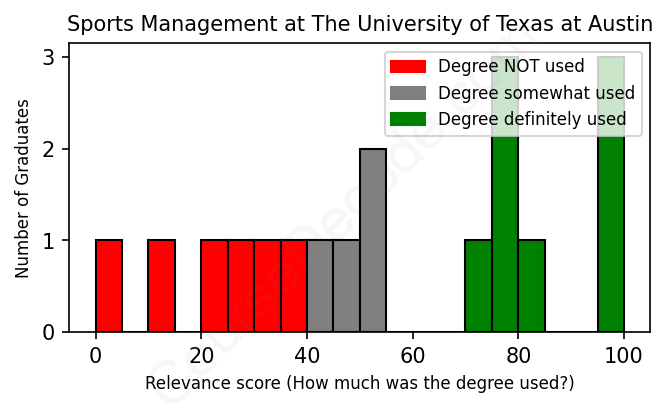
First, some facts. Of the Sports Management graduates from The University of Texas at Austin we've analyzed , here's how many have used (or NOT used) their degree in their career:

These are estimates based on AI analysis of 18 LinkedIn profiles (see below).
The verdict? Significantly below average. Overall, with an average relevance score of 56%, Sports Management graduates from The University of Texas at Austin have a much lower likelihood (-11%) of finding work in this field compared to the average graduate across all fields:
And for comparison, here's the chart for all profiles we've looked at across all degrees.
Also, after graduating, 44% of these graduates have pursued further education other than another Bachelor's degree (such as a Masters degree or other), compared to the average across all profiles of 35%. This suggests you may need more than just a Bachelors degree to be competitive as a Sports Management graduate.
See the details:
|
Relevance score: 70% We think this person has gone into a career only somewhat relevant to their degree. We think this person has gone into a career only somewhat relevant to their degree.
DEGREE INFOGraduated in 2010 from The University of Texas at Austin with a Bachelor's Degree in Sports Management. Also pursued further education since (see below). JOB HISTORY SINCE GRADUATIONConsultant-Business Development CLEAR (clearme.com) Jan 2014 - Oct 2014 Account VP  ZoomSystems 2014 - Jan 2020 SVP Business Development  Servy Jan 2020 - Apr 2023 Vice President Business Development  Delaware North Apr 2023 - Present FURTHER DEGREES DONE SINCE GRADUATINGJuris Doctor (J.D.)Southern Methodist University 2010 - 2013 ABOUTNo information provided. |
The top 10 most common jobs done by the graduates we've analyzed (ranked most common to least) are:
When looking at the job roles held by graduates from The University of Texas at Austin with a degree in Sports Management, it’s clear that many of them have ventured into positions that somewhat align with their studies. The most common types of jobs include roles in business development, operations coordination, and event management. For example, positions like Event Coordinator, Operations Assistant, and Marketing Manager at sports-related organizations explicitly make use of the skills and concepts learned in their degree, showing a direct connection to sports management.
However, it’s also interesting to note that a significant number of graduates have ended up in roles that don't directly relate to sports management. Jobs in industries like real estate and general marketing are common, where the graduates might leverage some transferable skills but are largely disconnected from sports. Some of these roles seem to focus more on business development or customer service without needing the specific knowledge that comes from a Sports Management education. Overall, while many graduates are working in positions that are relevant, there's still a sizable group that might not be fully tapping into the unique skills their degree has provided.
Here is a visual representation of the most common words in job titles for Sports Management graduates (this is across all Sports Management graduates we've analyzed, not just those who went to The University of Texas at Austin):

So, if you’re checking out the career paths of graduates from the Sports Management program at The University of Texas at Austin, it seems like a lot of them are carving out some pretty decent careers in various sectors. Right after graduation, many of them land roles that are either directly tied to sports or involve related skills, like event coordination, marketing, or operations. For instance, you'll find some early roles in sales at sports retail stores or internships with sports teams, which makes sense for those looking to get their foot in the door. It’s not uncommon for graduates to start off working with sports agencies, market research, or even coaching roles, which can really set the stage for more advanced positions down the line.
Fast forward five to ten years later, and many of these grads seem to have moved up into more senior positions, often in business development, project management, or various managerial roles within organizations related to sports, events, or even real estate. While there are some who veered off course into areas like marketing for non-sport-related companies or into event management for different sectors, many maintain a connection to sports in one way or another. Overall, it looks like a decent mix, where a fair number have genuinely pursued successful careers related to sports management, while others have diversified into different fields but still utilize skills they gained from their education. So, if you're considering this path, it definitely opens up a variety of doors moving forward!
So, getting a Bachelor’s in Sports Management at The University of Texas at Austin is pretty manageable, but it’s not a walk in the park either. Like any degree, it has its challenging moments, especially with classes that involve business fundamentals, finance, and the sports industry itself. You’ll probably have to do a good amount of reading, group projects, and possibly some internships, which can be a bit demanding. However, if you're super into sports and enjoy the subject matter, it can feel easier since you’re engaged with what you love. Overall, it’s about average in terms of difficulty—definitely requires effort but not the hardest degree out there.
Most commonly, in the LinkedIn profiles we've looked at, it takes people 4 years to finish a Bachelor degree in Sports Management.
So, looking at these sports management grads from UT Austin, it seems like they've been doing pretty well career-wise, especially the ones who graduated a bit earlier. Like, the 2010 grad is now rocking a Vice President role, which likely brings in a solid paycheck. Most of the others have moved up the ranks or held decent positions, although some of them started off with roles in sports and events that probably didn’t pay super well. The 2015 and 2016 grads seem to have gained some traction too, moving into managerial positions. Overall, it looks like the earlier graduates are bringing in some good money, while the more recent ones are still climbing their way up, but there’s a solid chance they’ll do just as well eventually!
Here is a visual representation of the most common words seen in the "about" section of LinkedIn profiles who have a Bachelor degree in Sports Management (this is across all Sports Management graduates we've analyzed, not just those who went to The University of Texas at Austin). This may or may not be useful:

Here are all colleges offering a Bachelor degree in Sports Management (ordered by the average relevance score of their Sports Management graduates, best to worst) where we have analyzed at least 10 of their graduates: